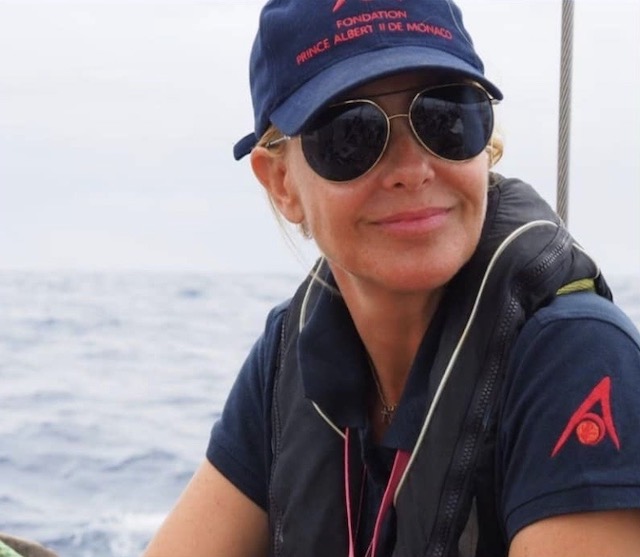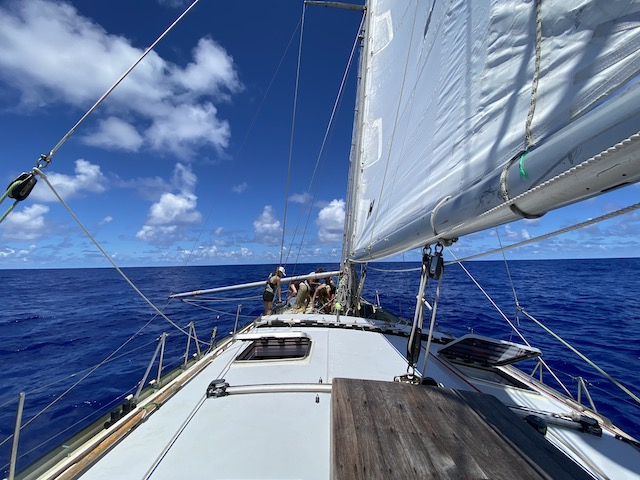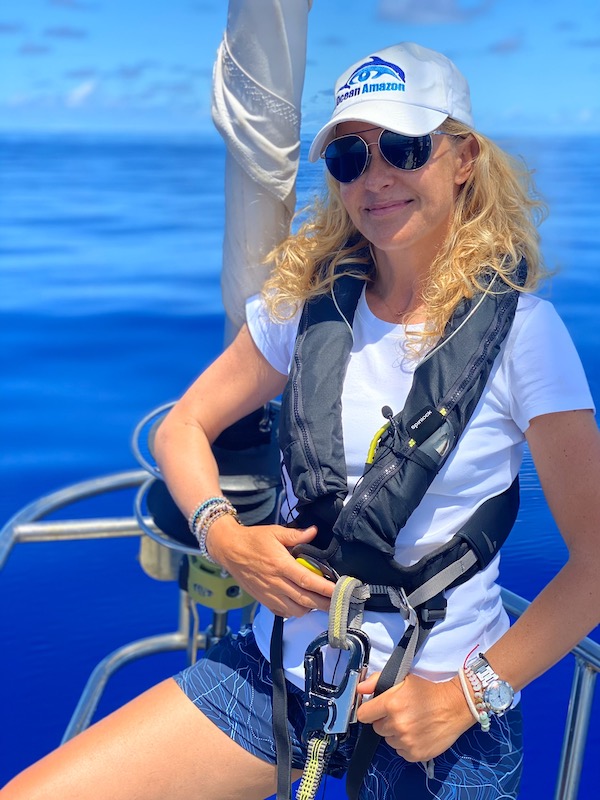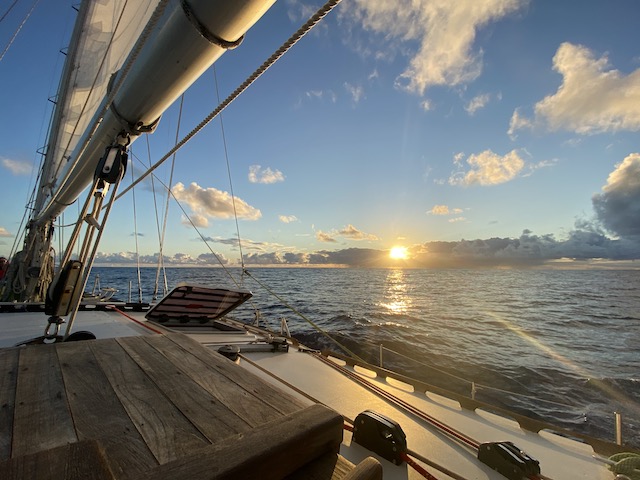I was so excited the day I was accepted to be part of the eXXpedition crew – a pioneering all female navigators group studying plastic pollution – to participate in an incredible sailing and research voyage between Galapagos and Easter Island. I spent the rest of 2019 preparing for this trip, educating myself and fundraising, impressed by the profiles of the other SEAsters on the voyage.
Another exciting moment was when we all met in the Galapagos, on 15th February, ready to board the boat. I finally got to meet all these exceptional women and looked forward to sharing 20 days together aboard the eXXpedition vessel.
I was expecting spartan and quite tough sailing conditions, but nothing prepared me for this. From the moment we left Galapagos, we were continuously on a 30 degree inclination and this became our normal state. Imagine doing everything, and I mean everything, at such an inclination. My bunk bed was leaning towards the galley, so in order to remain in it and be able to sleep, I had to lean against a net, which was locked at all times. A lot of things to had to be adjusted, and my body didn’t take quite well to it. I was confronted by violent bouts of sea sickness, despite the tablets being taken religiously, the homeopathic treatment I brought with me and the pressure points bracelets I was wearing. Nothing seemed to work.
I also didn’t seem to adjust to the shift times four hours on-duty, eight hours pause, and so on. The duties would involve everything from sailing the boat and cooking lunch or dinner, to cleaning the boat’s various parts. The others seemed to adjust much faster to the rhythm and weren’t really affected by sea sickness.
I’ve been sailing for almost 20 years, but only in the Mediterranean sea, having experienced different types of boats. But never the Pacific Ocean and surely not this path. I learned the hard way why there are only about 20 vessels doing our route in an entire year. Our boat was incredibly safe, equipped with all sorts of back up measures, and the crew were very experienced. And there I was, the imperfect sailor, pushing my limits to the max and still feeling like a fraud compared to the rest of the crew.
I reached a low point on day six of the voyage when my body just couldn’t cope with the movement of the boat, the sailing, the round the clock schedule of duties, and the ocean’s lack of mercy towards me. It surely wasn’t the experience that I had been dreaming about for a whole year! It was tough to feel that I was not contributing enough compared to the other girls, nor doing enough for my Ocean Amazon documentary.
As I was laying down on my tiny bunk bed in the night and feeling each wave moving every inch of my body, I had a revelation. I realised that as long as I resist and react to whatever happens to me, I will be suffering, overwhelmed by the ocean’s movement, the sailing conditions and a sleeping rhythm that was completely different to what I was used to. In this moment, I allowed myself to be vulnerable, even in the face of fear, and surrendered to what is. I realised that although I cannot change the outside factors, there are things that I can control: my breath, my mindset, my connection to the other women on-board.
It is by looking fear in the eye and saying “not today” that helped me to break free of my suffering and allowed me to level up on my journey. It is this shift in mindset that helped me find inner strength and confidence. And I took one breath at the time, building one positive thought after another, finding strength in each act of kindness from the other women towards me, their jokes and uplifting comments. And defying my sickness, distracting myself by looking at the beautiful sky full of stars, the surreal sunrises and sunsets, and the wonderful bond which was created between us on-board.
From this moment, my journey had a radical shift. I felt better, I was able to participate in all the activities and enjoy the incredible journey I was on.
Before I knew it (well, two weeks later) we safely reached Easter Island, after having a taste of an enormous storm, which went on to hit the island. The last night of our navigation was what I called the “graduation”, a final test in navigation, with gale-force winds, powerful waves and currents. It was thrilling and physical and we were one with our amazing boat.
It was an incredible moment when we saw land on the horizon, all of us excited to touch land after 20 days on the boat, while at the same time nostalgic that it had all come to an end. Having shared such amazing moments with my SEAsters, building a bond and connection beyond words, and commiting to be agents of change back in our communities. Little did we know about the new global reality of the Covid-19 pandemic.
The fact I was an imperfect sailor, not really prepared for such a sailing voyage, shows to what extent I will go to be part of a movement to protect our oceans and planet. Just as I am an imperfect activist. I think it is essential to connect the consequences of our use of plastics with the state of the ocean in order to create awareness and change.
None of us are living the way we really need to in order to steer the future of our planet in a different direction. We are all limited by the realities of living in society as it is now, and it is the structures of that society that really need to change.
These past weeks, as the world faces a global pandemic and each one of us is confined at home, we’ve realised the power that we have individually and how much we can do if we all rise together.
I’m certainly not diminishing the role of individual actions, they matter very much. We should all be mindful of the choices we make every day, and try to make them as sustainable as we can, because they impact our environment, our ocean.
One of the great workshops we did onboard during our journey was the ‘Solutions Proposal’ under Winnie’s guidance (Dr Winnie Courtene-Jones, the scientific mission leader of eXXpedition). Each one of us had to present solutions to protect the ocean, whether at the source or as a last resort before plastics and garbage enter it. The solutions were different for everyone. There are a myriad of things that we can do, from carrying a reusable cup to refusing plastic straws, to cleaning up beaches, installing filters on the drainages that flow into the ocean, refusing to purchase goods packaged in single use plastics. Each and every one of these decisions is a step in the right direction. If we can’t do as much as we’d like as an individual, we shouldn’t feel disqualified from the environmental movement altogether. In fact, it’s quite the opposite.
What we need is to be able to make these individual choices easy – where it’s not more expensive or more difficult to opt for the path that is going to preserve the planet for the next generation. Our group concluded that we need to be putting pressure on governments and corporations to make decisions on a macro level which will enable us to live our lives in a way which not only protects the environment we depend on but improves it. And those governments, those corporations, need to be putting in place policies that will maximise the potential for humans to turn this world around. It’s amazing how these conclusions resonate so much more with today’s realities.
Because it is within this decade that we shall act, before it is too late. If we could all put our shame and paralysis to one side – our guilt for the comforts we have come to dependant on, for not having taken decisive action before now – then this could be a time of great opportunity. We need to accept the realities of the lives we have led up until now, to forgive ourselves for the choices we have made. It is only when we take this step that we will be able to open our hearts to the magnitude of the challenge we are facing, and set our minds upon the epic and essential task of finding solutions. And it is important to start with the first step and then the next will follow. Let’s not let ourselves get overwhelmed by the immensity of the challenge, but by the opportunity that awaits us.
Looking back on my navigation and research with eXXpedition, I am thrilled to have had this incredible experience and enriched in more ways than I could have dreamed of. I am very grateful for the opportunity and stronger than ever. Was it hard? Yes! Was it worth it? Absolutely yes!
Follow Ocean Amazon on Facebook and Instagram
www.ocean-amazon.com
https://www.youtube.com/watch?v=fZ-pUxvu53s
The imperfect sailor and imperfect activist




